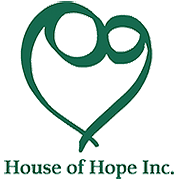Our Mission
As two distinct nonprofit organizations, House of Hope and House of Hope Housing have two distinct missions.
House of Hope Shelter
House of Hope, a temporary shelter, provides advocacy and care for homeless families. Rooted in a belief in God, and under the direction of an ecumenical board, it seeks to affirm the dignity of life to all who are served.
House of Hope Housing
House of Hope Housing is a not-for-profit organization created in 2002 by House of Hope in response to the ever-growing, critical need for affordable housing for families in Massachusetts. House of Hope Housing provides affordable permanent housing and support services to previously homeless families with an enduring commitment to build family economic self-sufficiency, promote neighborhood stability, and provide educational opportunities to improve the lives of our poorest children.
Our History
House of Hope was founded in the mid-1980s, as the nation struggled through a deep recession and homelessness exploded. Once perceived as an affliction of men with mental health and/or substance abuse issues, the trauma of homelessness now encompassed a different demographic—women and children.
A group led by the Rev. Paul Bailey of St. Michael’s Church joined with the Ethnic Covenant to set up a house for the homeless. In April 1985, Sister Jeanne Poor was hired to lead the House of Hope, modeled after Lazarus House in Lawrence. Soon after, House of Hope entered a $1 annual lease with the former St. Joseph’s Hospital for the first two floors of 812 Merrimack Street. After extensive renovations, and the donation of 100 Army cots, House of Hope opened December 24, 1985.
In its first year, House of Hope served adult homeless individuals as well as families. As the Middlesex Shelter, now the Lowell Transitional Living Center, opened in 1986 to serve single homeless adults, House of Hope’s focus shifted to the needs of women and children forced into homelessness.
The need for permanent housing
By 2000, family homelessness had become a crisis. Soaring housing prices and government funding shortfalls for supported low-income rental units put more and more women and children in precarious situations, often aggravated by stress due to poverty, major life events, and the fragmentation of families. Homelessness is devastating for families and jeopardizes every stage of a child’s development. The profound trauma of homelessness can lead to hunger, developmental delays, poor physical and mental health, and missed educational opportunities. Children require secure housing to thrive, and mothers need secure housing to obtain the education and employment necessary to build their own self-esteem, as well as that of their children.
Understanding that permanent affordable housing is the key to ending homelessness, in 2002 we established House of Hope Housing as an independent but affiliated nonprofit. Together, House of Hope and House of Hope Housing would work to transition homeless families into safe, stable communities with links to support services. Our approach is unique in that it provides “supportive housing” to families, with case management services provided to families as needed to assist them in overcoming life’s hurdles, managing any behavioral or physical health issues, building economic self-sufficiency, and providing educational opportunities for them and their children.
“The House of Hope is a remarkable development with a mission to combat family homelessness. Recognizing the multi-faceted approach required to get the Commonwealth’s most vulnerable back on their feet, House of Hope offers deeply affordable, income-restricted units alongside job training and stabilization services to help families thrive and achieve independence.”

